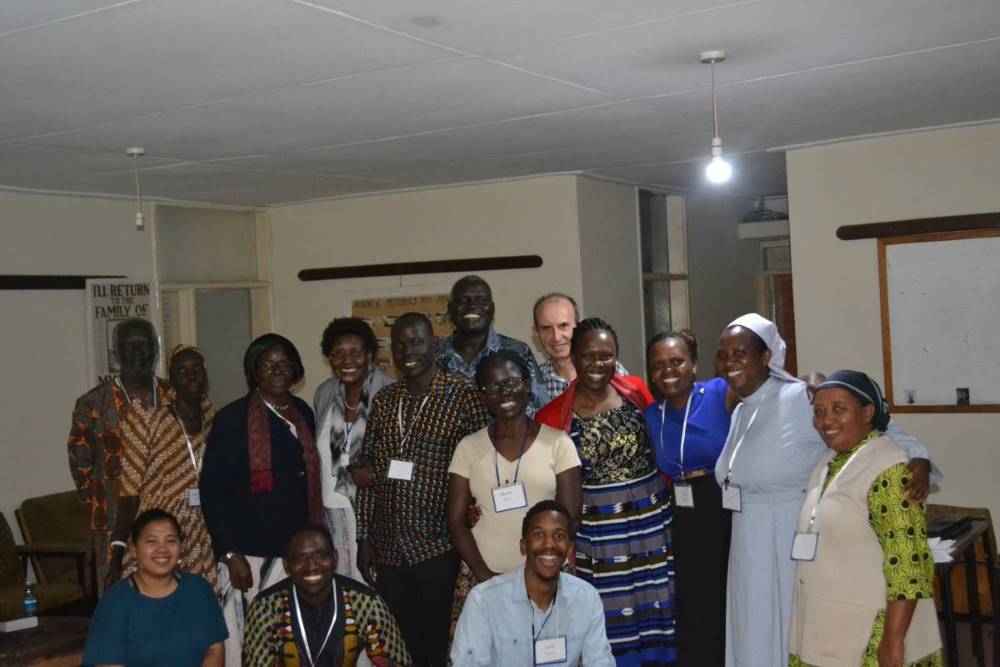
Six Divinity School students traveled to Kampala, Uganda to attend the eighth annual Great Lakes Initiative (GLI) leadership institute on Jan. 7-12, 2018. Micah Dennis, M.Div. ‘20; Deandre Dukes, M.Div. ’20; Shakeel Harris, M.Div ’18; David Le, M.Div. ’20; Martha Monnett, MPH/M.Div. ’18; and Alexandra Thomas, M.Div. ’20; along with associate professor of historical theology J. Warren Smith, and CFR Operations Director Abi Riak attended the institute. Harris and Monnett chose to attend for the second time, supporting themselves after participating in previous years with funding from CFR.
During the weeklong program, the students learned from leading practitioners of reconciliation, including renowned African theologians Dr. David Kasali and Dr. Celestin Musekura. They joined over 150 scholars and practitioners of reconciliation from the Great Lakes region of Africa (Burundi, Democratic Republic of the Congo, Kenya, Rwanda, South Sudan, Tanzania, and Uganda), Sudan, and the U.S. Smith and Riak are also members of the GLI board of directors and have contributed to developing the long-term strategy to deepen the resilience and rootedness of the GLI in the Great Lakes region.
The Center for Reconciliation sends students to the GLI leadership institute as part of its commitment to form students as ambassadors of reconciliation and aims to provide students with insight on how to work towards reconciliation efforts in their future ministries.
“Before the GLI institute I had always thought of reconciliation as purely a theoretical concept instead of a lived, embodied reality. The GLI institute offered me a new way to perceive how reconciliation, when grounded in scripture as well as our everyday contexts, is a practical spirituality. To live as an ambassador of reconciliation is to fully engage the brokenness of this world as a place that Christ revealed to be a new creation,” Thomas said.
In addition to learning from speakers and participating in seminars on reconciliation, the students also went on a pilgrimage of local sites that offered a vision of reconciliation. Le said the most memorable experience for him was visiting the Ugandan Martyrs’ Museum, which was built over the execution site of 55 Christian martyrs who refused to denounce their faith during a political struggle in the late 1800s.
“Our visit to the Ugandan Martyrs' museum was moment of breathtaking reality centered on message that the ‘blood of the martyrs is the seed of the church.’ I am convicted by the witness of how Ugandan Christians gave up their very lives for the Christian faith,” Le said.
Dennis said one of the most meaningful experiences of the institute was reading the Bible alongside East African pastors and leaders, given the context of political conflict in the Great Lakes region.
“I learned to read the Old Testament in a new way: by looking over the shoulders of fellow Christians for whom the prophets had an immediacy and applicability I’d never sensed,” Dennis said.

As students learned how African Christians grappled with years of war and death, they also brought back new perspectives on the process of reconciliation in the U.S.
“Such lived testimonies of choosing to follow Jesus in the midst of famine, civil war, tribal conflict, torture, and death are inconceivable here in the relative safety of our lives in the U.S., Monnett said. “When I see two men from different tribes who have had family members killed by members of the other's tribe stand beside one another and proclaim that they are brothers because of what Christ has done for us, my idea of reconciliation is changed.”
“When I look at the many divisions in our country and particularly those pertaining to the African Americans and America, I see and sense an insurmountable amount of unaddressed trauma trapped within the body of America. It is my hope that during my time here at Duke, I may acquire greater tools that are useful for contributing to the overdue reconciliation within our country,” Dukes said.
Since the institute’s inception, Duke Divinity School has sent 31 students, 16 staff members, and 3 faculty to attend.
The CFR is one of the founding sponsors of GLI, which is part of a larger initiative that began 12 years ago. The initiative continues throughout the year with an intentional focus on building country-level reconciliation networks. The CFR also plans to host three members of the GLI community at this year’s Summer Institute for Reconciliation at Duke Divinity School.